Crisis of Ethics, Accountability and Governance: Genesis, Growth & Solution
Total Views |
National Seminar
25-26 October, 2013, Indian Institute of Public Administration (IIPA), New Delhi
IPF’s constant endeavor to break new grounds in policy making and policy intervention played as a catalyst to organize two-day National Seminar on declining standard of governance in India which led to the decimation and disappearance of ethical values in governance. The erosion of values, accountability is evident in the functioning of administration. The vision of democratic governance is cherished and practiced to restore people’s confidence in the sincerity and transparency of the system.
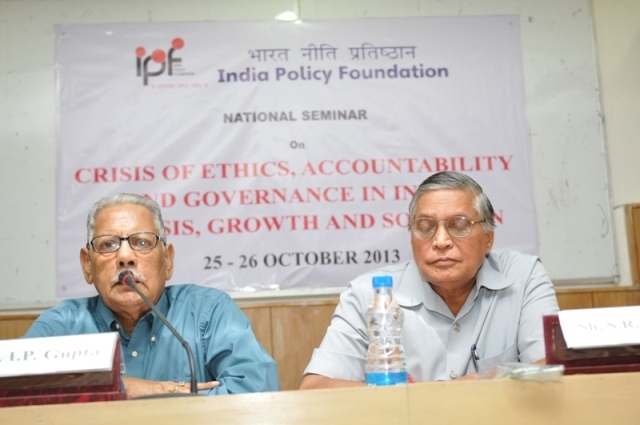
The advent of globalization has brought glittering spectacle of wealth and prosperity that tempts people to become its easy prey. It has adversely affected all walks of life- social, economic, political and moral. The uncritical adoption of libertarian values has made people unrepentant on the loss of values both at personal and social levels. It seems that we have all become prisoner of our insatiable desire that detracts us from our responsibility to the fellow citizens. It is quite evident in our day to day life and functioning. Unfortunately, the political class, trusted with the responsibility of ensuring accountability and justice to the people, has first become the victim of the imperatives of globalization. The sheer size and intensity of corruption by the political class has made common people quite indifferent and bitter towards the political process. Scams after scams have shaken people’s faith in the system. This emerging situation has thoroughly delegitimized politics, administration and the system. As a result, this has given rise to crisis of credibility, accountability and governance.
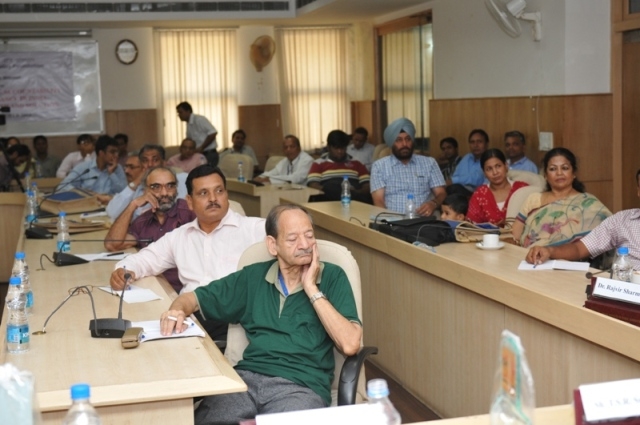
In the context of this understating, IPF took the initiative to organize this seminar inviting a number of social thinkers, intellectuals, administrations, panelists and other eminent personalities from the different parts of the country to participate and present their invaluable suggestions to arrest the deteriorating standards of politics and administration.
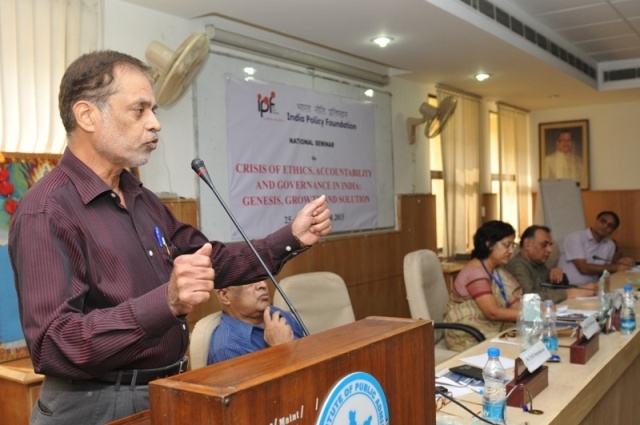
All the presentations made in the two-day seminar expressed their deep anguish over the prevailing situations. The decline and lack of governance has made life difficult for the common people. The delivery capacity of various institutions has been seriously undermined by the unrestrained menace of corruption and unaccountability. The centralizing tendency both in the government structures and political parties has made them inaccessible to the ordinary people. These persisting ills can be checked and corrected only through making the system responsible to the needs and aspirations of the people. Distinguished speakers underlined the pressing need to re-vitalize the existing democratic structures. The underlying theme of all the speakers was to bridge the widening gap between the administration and the people. Once it was achieved, ethical values could be easily restored, crisis could also be averted. There was special emphasis on decentralized governance for people’s participations. It was argued that mere representation would not ensure democratic governance; rather people’s participation in decision-making process at all levels would guarantee accountability and transparency. The ills that have crept into the system could easily be tackled through people’s participation as this would raise their stakes in the proper functioning of the system. Further, participatory democratic governance would also achieve the goal of inclusive development. One after another speaker cited various plan documents of the government to substantiate their arguments in the favour of decentralization. Besides, the autonomy of democratic institutions should not be compromised. In this regard, specific example of CAG was cited to impress upon the need to ensure accountability of the institutions and functionaries of the state. To inculcate awareness of decentralization, governance, accountability, law and morality, it was highlighted that they should be included in the school syllabus. Awareness and enlightenment about these necessary values should begin right from the school level so that long term valuational transformation could be effected.
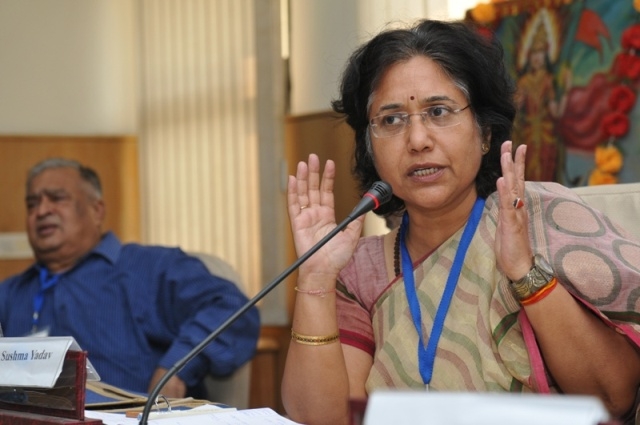
INAUGURAL SESSION
Chief Guest: Justice Dr. M.K. Sharma, Former Judge, Supreme Court
Keynote Address: Shri T.N. Chaturvedi , Former CAG, Governor and presently Chairman, IIPA
Chair: Dr. Yogendra Narain, Former Secretary-General, Rajya Sabha
Convener: Prof. Rajvir Sharma
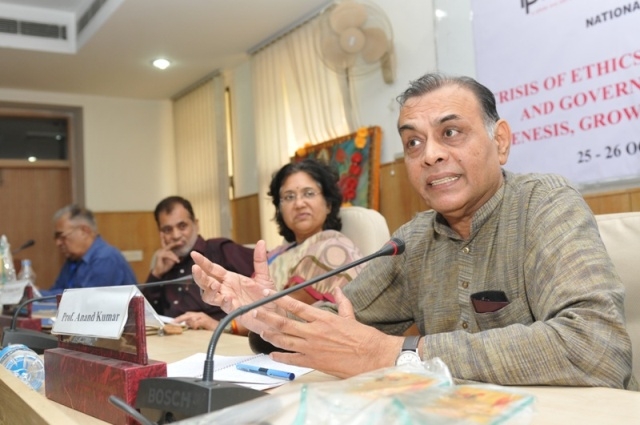
The seminar was inaugurated by former Judge of Supreme Court Justice Dr. M.K. Sharma. Justice Sharma was also the chief guest at the inaugural session, who congratulated and appreciated organizers of the seminar for choosing such a burning and relevant topic in the present scenario. In his enlightening inaugural address, he emphasized, on difference between law and morality. He pointed out, “All illegal actions are immoral but all immoral actions are not illegal. He emphasized that all issues of the world would be resolved if we adhere to the concept of dharma in the Indian traditions i.e. duty to perform right things”. He also raised the issue of globalization, which is not adapted in Indian context but dictated by the external forces.
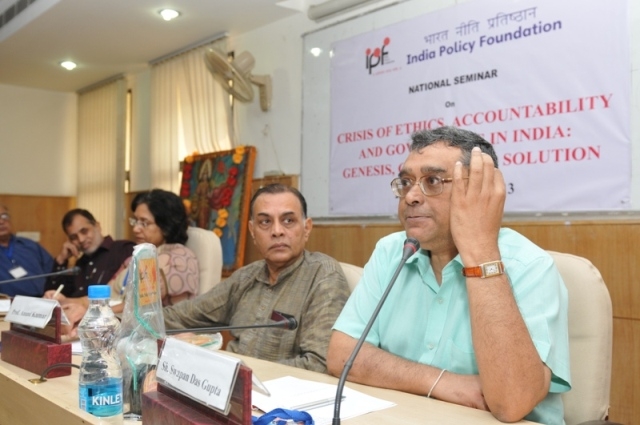
Former CAG and the Governor of Karnataka, presently the Chairman of IIPA, Shri T.N. Chaturvedi delivered the keynote address at the first session. In his illustrative address, he called for an anticipatory government that can help us eliminating the crisis beforehand. He said, “In the administration, ethics and values have a very significant place. We must strive to ensure that ethical values percolate down to our children and in our society. So the issue of ethical conduct should be included in the educational syllabus.” Talking about the need of professional ethos among public servants and strong civil society, he called for evolving a system that is guided by the spirit of a joint venture between people and the government aimed at enhancing the quality of life of people.
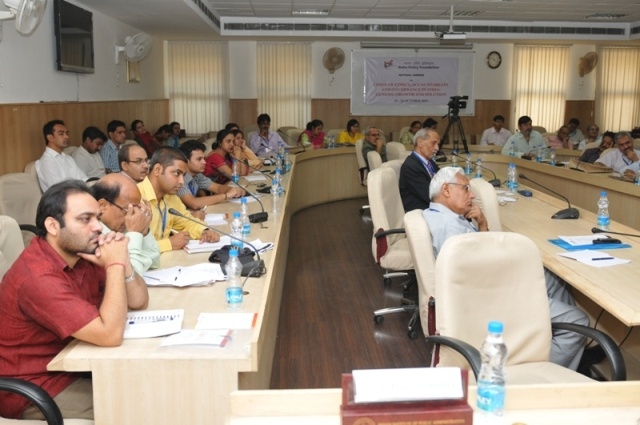
He said that fix tenure of civil servants was the precondition for impartial and objective functioning of the system. He argued rightly that freedom from the responsibility is the root cause of corruption. It was agreed by all assembled in the seminar that Shri Chaturvedi really provided the much-needed practical and theoretical dimensions to the context of seminar.
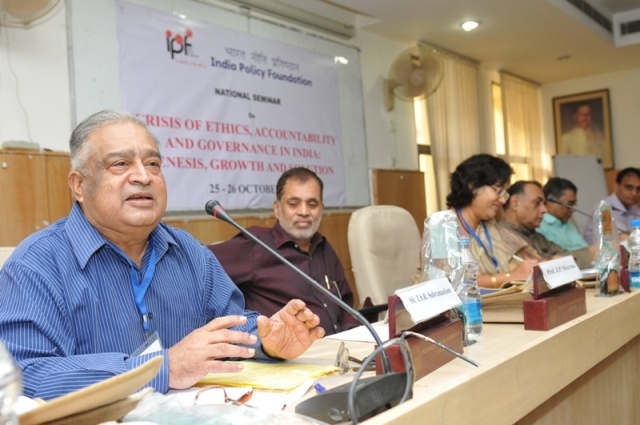
Dr Yogendra Narain, former Secretary-General, Rajya Sabha who delivered a thought provoking presidential address, said that there was no need to be pessimistic. The system might be in the emergency ward but was still not in the intensive care unit. He stated that there were fairly good chances to restore its health. He called to regenerate, strengthen and rejuvenate the civil society.
TECHNICAL SESSION
Keynote Address: Prof. Pranab Banerjee, IIPA
Chair: Prof. Kuldeep Singh, GND University, Amritsar
Speaker: Shri Paranjoy Guha Thakurta, Senior Journalist
After the inauguration, the second technical session began with a very well researched and a well-articulated keynote address by Prof. Pranab Banerjee and senior journalist Shri Paranjoy Guha Thakurta. They presented a realistic narration on corruption in media as the problem was not of personal bribery but of institutional corruption where media has either turned a blind eye or has indulged in unethical practices.
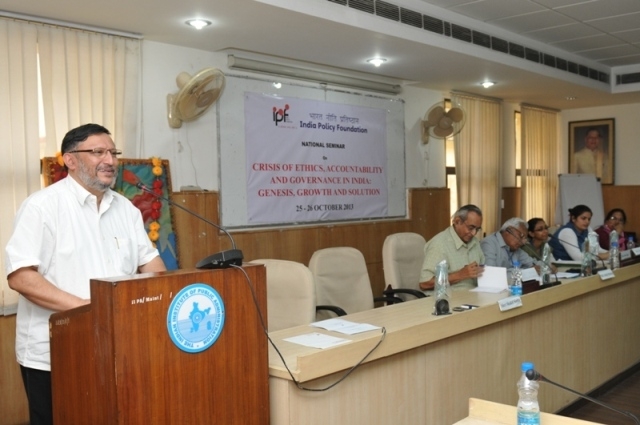
Prof. Banerjee talked about forms and ambit of corruption, measurement of corruption on the basis of perception and experience, consequences of corruption with reference to the investment, entrepreneurship and sustainable growth etc. Pointing out various causes of corruption like extensive rules and regulations, principal agent theory, he gave a new approach to deal with corruption i.e. Human Development Approach.
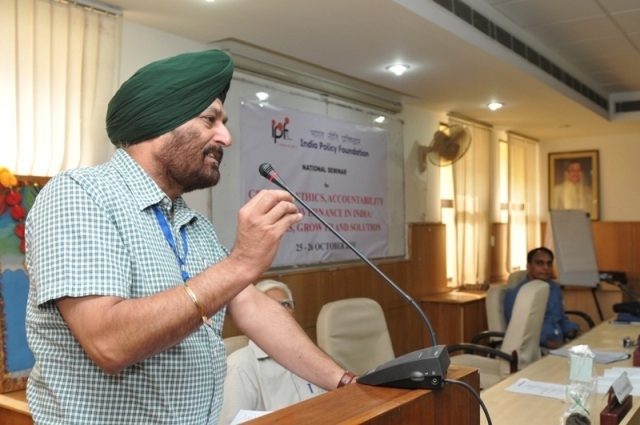
Prof. Kuldeep Singh, head of the department, Political Science, GND University, Amritsar presided over this session. In his presidential address he made a very realistic and feasible analysis of this widespread menace. He said, “Since politics is the root cause of every problem and is the only solution, we must understand the politics in its right context. Unless we do a right diagnosis no permanent cure is available. So we have to understand and deal with the changing issues of time and understand the economic, cultural and social dimensions of politics.”
PANEL DISCUSSION
DECENTRALISED GOVERNANCE IN INDIA:
IS IT PROVING TO BE AN ANSWER TO BAD GOVERNANCE?
Chair: Prof. H.K. Sharma, University of Allahabad
Panelists: Prof. Jaytilak Guha Roy (IIPA), Prof V.N. Alok (IIPA), Dr. C. Sheela Reddy (IIPA)
Dr. Kusum Lata (IIPA), Dr. Satish Patel (Surat)
The third session was a panel discussion on decentralized governance in India, which is proving to be an answer to bad governance. The session was chaired and moderated by Prof. HK Sharma, director, Academic Staff Collage, University of Allahabad, Allahabad.
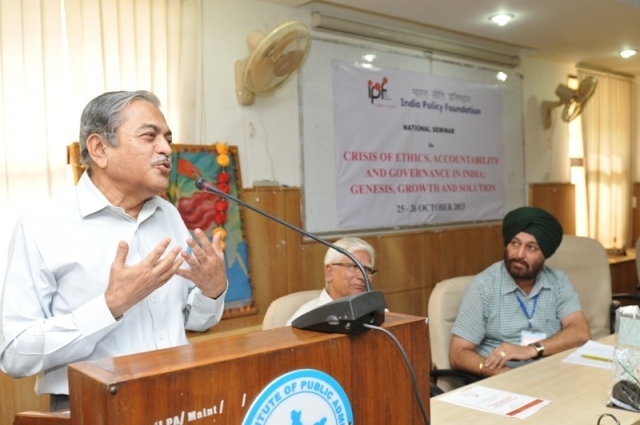
Prof. H.K. Sharma, in his presidential address, brought out the structural and functional dimensions of the local bodies and expressed the view that actually the situation is no way better than diarchy under the government of India Act, 1919. At the same time, he also said, there was no need to be disappointed and gloomy. He felt that India can have some kind of satisfaction that there are several accountability and good governance mechanisms in place including steps taken to strengthening rural and urban local bodies. Still much remains to be done in the area of real empowerment of the grassroots level representative organizations, though there are many success stories that can be seen as an example of India’s good governance story.
Initiating the discussion, Prof. Jaytilak Guha Roy, former professor of political science, Indian Institute of Public Administration (IIPA), said that sometimes decentralization appears an answer to the bad governance and sometimes not. He quoted his experience based on various studies and said that for being an answer to bad governance decentralization must be pro-active.
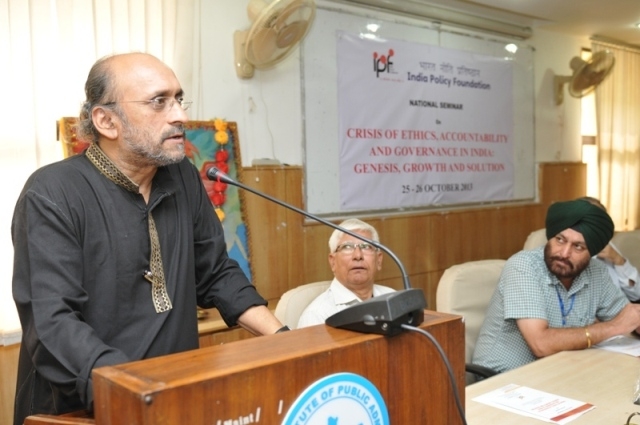
Prof. V.N. Alok, Professor at IIPA, said that decentralized government can be an answer to the bad governance only if it is made answerable not only to upper level of government system but to citizens as well.
Dr. C. Sheela Reddy, faculty from the IIPA, pointed out the credibility gap in Indian administration. It was necessary in her opinion to maintain parity of relations between local bodies and the state government similarly, as it is for the Centre and state relations.
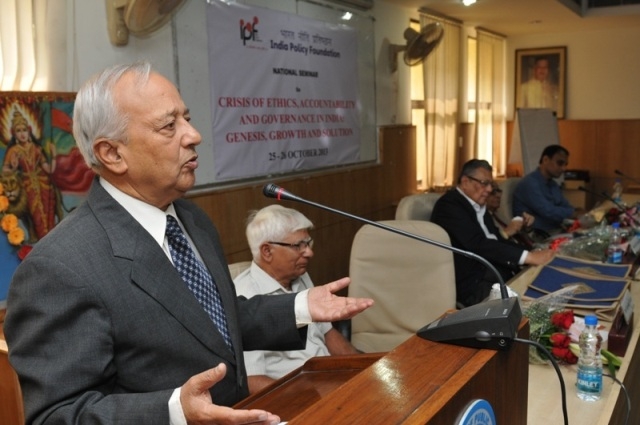
Dr. Kusum Lata, Associate Professor in IIPA, expressed optimism by saying that decentralization was the right step in the right direction for providing accountable, responsive and open governance which are some basic preconditions for good governance.
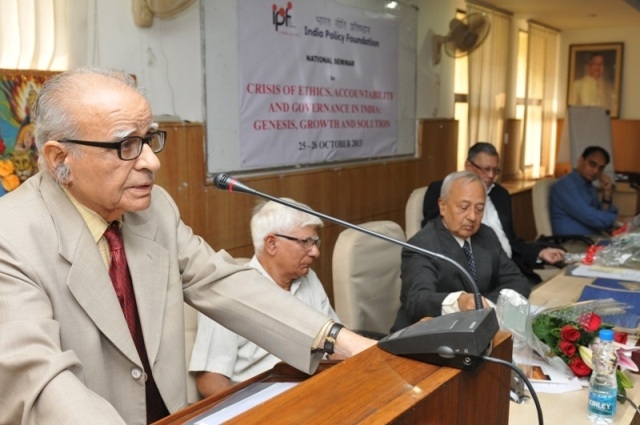
Dr. Satish Patel, Professor of public Administration in South Gujarat University, Surat, expressed his views on the basis of his vast research and teaching in Gujarat as how local bodies are really empowering the downtrodden in the society.
TECHNICAL SESSION
Keynote Address: Sh. Shakti Sinha, Retd. IAS
Chair: Prof. O.P. Minocha, Former Professor, IIPA
Speakers: Prof. Ashok Sharma, Professor Emeritus, UGC, Ms. Pooja, Mphil Scholar, JNU, Dr. Mridula Sharda, Shimla, Ms. Devi Roy, Ph. D Scholar, JNU
Shri Shakti Sinha, IAS officer (retd), in his keynote address defined the lack of clarity of the role and jurisdiction of the government. He said that realistic policies should be made after establishing a link between problem and solution.
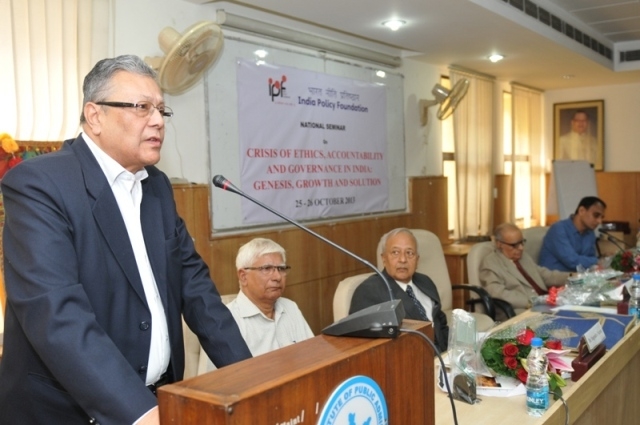
Ashok Sharma, Prof. Emeritus of UGC put forward an enlightening paper on CAG and talked about its position on performance-audit and stressed the need to seriously take care of CAG’s recommendation and government to be made responsible for actions taken on his reports.
Ms. Pooja, M.Phil scholar of JNU, presented a paper on judiciary as the agent of change for ethical and accountable governance. Referring to the criticism against the judicial overreach, she stressed for looking at both positive and negative sides of the issue.
Dr Mridula Sharda from Shimla presented a well-researched paper. She put forward big issues of local bodies i.e governance, accountability and participation.
Ms. Devi Roy, a Ph. D scholar of JNU, presented a paper on the theme of good governance in Indian administration.
Prof. O P Minocha, former professor at IIPA, in his presidential address provided deep insights and presented his vision of reforming the society with pragmatic reforms through which people would ultimately get the government they deserve. But there is a need to change the society and system.
2nd Day- Oct 26, 2014
PANEL DISCUSSION
ISSUES OF ETHICS AND ACCOUNTABILITY IN GOVERNANCE OF INDIA: PROMISE, PERFORMANCE AND THE ROAD AHEAD
Chair: Prof. Sushma Yadav, Professor, IIPA
Panelists: Shri T.S.R. Subramanian, Former Cabinet Secretary, Shri Swapan Das Gupta, Noted Thinker, Prof. Anand Kumar, Professor, JNU, Prof. J.P. Sharma, HOD - Commerce, Delhi University
On the second day, panel discussion on the issues of ethics and accountability in governance in India, promise performance and the road ahead took place. Prof. Rajvir Sharma introduced panel and the theme. Prof. Sushma Yadav of IIPA chaired the session.
Shri T.S.R. Subramanian, former Cabinet Secretary, spoke about the menace of corruption. He opined that the failure of India and her constitution to adopt and effectively apply checks and balances and non-recognition of new paradigm of management perspective was at the root of rising corruption, unethical practices and behavior in governance. He said that commitment of bureaucrats with political parties instead of policy has become a problem. It continues to grow. Politics has turned into business. He suggested various measures like Lokayuktas, Lokpal, vigilant directors and severe punishment for corrupts.
Shri Swapan Das Gupta, a noted thinker, dwelt upon the historical dimensions. How regime of shortages, collusion of politics and business made bureaucracy as the defect riles. He also talked about the system of secrecy as called for nationalization of state on quality and type of politics.
Prof. Anand Kumar of JNU with his contextual and witty address called for self-interrogation. He talked about 6 crises -- development crisis, legitimacy crisis, democracy deficit, nation building deficit and citizenship building. He held that corruption at high places, crony capitalism, and centralization of authority and crime-politics nexus were the factors responsible for these crises. He said, “In this market-morality trajectory, we will lead to no-win situation. We need active citizenship to avoid action paralysis and participative democracy in place of representative democracy to solve the present crisis.”
Prof. J.P. Sharma, head of the department of commerce, Delhi University, delivered extensive lecture on corporate governance. He explained the failure of Indian corporate system with the example of Satyam and how it was a failure of government-corporate structure.
Prof. Sushma Yadav in her presidential address elaborated the idea expressed by the panel and said that crisis solution would be found only with empowerment of citizens. When social ethos are restored and looking at India’s own tradition, she asked whatever we have, we need to implement it honestly and only public service can make any difference.
TECHNICAL SESSION
Chair: Prof. B.L. Shah, Kumaun University, Nainital
Keynote Address: Prof. Sheila Rai, Rajasthan University
Speakers: Ms. Varsha Gautam, MPhil Scholar, JNU, Dr. Gyanendra Sharma, G.B. Pant University, Dr Govind Sharma, Kota University, Dr. Pradeep Paradia, IIPA
Prof. B.L. Shah from Kumaun University, Nainital chaired the next session. In her keynote address, Prof. Sheila Rai from Rajasthan University called for indigenous model of development. She said, “We must not miss the hitherto ignored cultural context. It is just because we have adopted dictations from outside and that also practically we are facing a sense of apathy. The problem of committed bureaucracy and conflict in policy-making has created the problems, which need to be addressed with indigenous model.”
Ms. Varsha Gautam, M Phil scholar from JNU, put forward how criminalization of politics, decline of parliamentary process, lack of internal democracy and first past the post system were creating problems for democratic process as a whole and for the processes of ethics, accountability and governance in particular.
Dr. Gyanendra Sharma from G.B. Pant University said that development process was always talked about in isolation without involving people. Information and communication technology had tried to fill this gap but nexus of politics and bureaucracy need to be addressed. Dr Govind Sharma from Kota University said, “Unless internal democracy in political parties is restored, we can’t have any desirable result.” He focused on the idea that there was an urgent need to put the principles of ethics and accountability of the system into action in order to realize the dream of good governance.
Dr. Pradeep Paradia brought in a new dimension to the issue of crisis of ethics and accountability by underlining the need of the accountability on part of citizens with accountability on part of the government.
TECHNICAL SESSION
Another technical session was chaired by Prof. Ajmer Malik from Kurukshetra University. In his address, Prof. Sanjiv Mahajan from H.P University, Shimla drew attention of participants towards the declining values and degrading ethic, which need to be arrested in order to find a credible solution to the present day ills in governance. He emphasized on the need for cost reduction to sustain in LPG era and also called for a reversal of the trend of mistrust in governance.
Prof Dharmendra Mishra from Bhilwara presented a conceptual paper on CAG and proposed various reforms based on comparative studies and called for openness in the working of Parliamentary committees and follow up of the CAG reports to be taken with care.
Prof. Neelam Sharma from Jaipur presented a paper on judicial accountability and put forward how it was fundamental in ensuring accountability of the entire system and proposed an enlightening set of reforms for making it accountable.
Dr. Deoraj Singh asked for following ethics at individual level and collective action. Then he stressed on social justice. Ms. Daisy Sharma put forward four key points like freedom from irresponsibility, no-decision making, trust deficit and lack of internal democracy and systemic problems of corruption. She stressed that ethical crisis is the grave danger to the accountability in Indian administration.
In his presidential address Prof. Ajmer Malik, while summarizing points that were put forth by all panelists, concluded that solution to this menace must come from within.
VALEDICTORY SESSION
Chief Guest: Shri S.R. Sharma, Retd. IAS
Chair: Shri I.P. Gupta, Retd. IAS
The Chief Guest of the valedictory session Shri S.R. Sharma, an eminent administrator and retired IAS, presented a complete ethical dimension of the current scenario that needed an overhaul. He said, “Ethics begins from the individual so we must be accountable to our inner self and conscience.” He stressed on the need of introspection and adhering to truthfulness.
In his presidential address, Shri I.P. Gupta, IAS (retd), said, “We must imbibe Indian ethos in our behavior to have a real impact.” He enlightened the audience about the degeneration of parliamentary process, local bodies and declining condition of quality to pitiable level.
Prof. Rakesh Sinha while giving vote of thanks said that IPF would continuously strive hard to save the country from the recession of ideas. This seminar has not only produced intellectual discussion but intellectual discourse that will certainly be important contribution towards making the society and polity more responsive, empathetic, ethical and accountable to produce more result-oriented productive and inclusive governance. He maintained that decolonization of Indian minds was the need for finding solutions to the present state of Indian affairs. He again repeated for the need of independent think tanks and thanked all the participants for contributing towards intellectual growth.